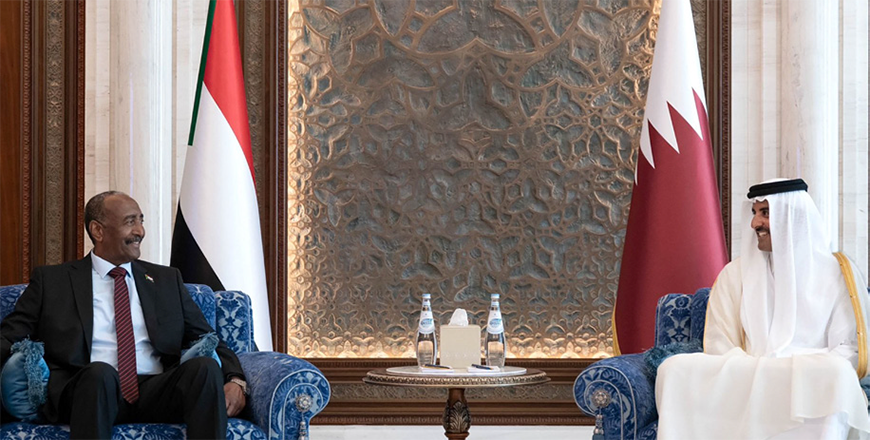DOHA — Sudanese army chief Abdel Fattah Al Burhan met Qatar's emir on Thursday during his third trip abroad since war broke out in April, after also visiting Egypt and South Sudan in recent days.
Burhan, whose troops are fighting the paramilitary Rapid Support Forces (RSF), had spent months under seige inside the military headquarters in Khartoum and stayed in conflict-hit Sudan until late August.
In Doha, he received a red carpet welcome and discussed "the latest developments in the situation and challenges facing Sudan" with Emir Sheikh Tamim Bin Hamad Al Thani, said a Qatari royal court statement.
Burhan left Doha on Thursday afternoon, the official Qatar News Agency said.
The war between Burhan and his former deputy, RSF commander Mohamed Hamdan Daglo, has killed at least 5,000 people, according to a conservative estimate from the Armed Conflict Location and Event Data project.
Late on Wednesday, Burhan issued a decree dissolving the RSF, while the United States slapped sanctions on senior commander Abdelrahim Hamdan Daglo, the brother of the paramilitary leader.
Sudan's ruling Transitional Sovereignty Council said in a statement the decree was "based on the repercussions of these forces' rebellion against the state, the grave violations they committed against citizens, and the deliberate sabotage of the country's infrastructure".
Rights campaigners have blamed the RSF and allied Arab militias for reported atrocities including rape, looting and the mass killings of ethnic minorities, primarily in the restive western region of Darfur.
The army has also been accused of abuses, including reports of indiscriminate bombing of civilian areas with RSF presence.
Burhan made his first foray outside the military headquarters last month and has visited regional allies in recent weeks.
Since leaving the capital Khartoum, he has been based in Port Sudan, an eastern city that has been spared the fighting.
Government officials and the United Nations have similarly relocated to the coastal city which hosts Sudan’s only functioning airport.
‘Legitimacy’
Late last month, as rumours swirled of negotiations aimed at ending the crisis, Burhan flew to Egypt, historically his closest ally, followed by a visit to South Sudan this week.
“The significance of [the trips abroad] is to confirm the legitimacy of Burhan with the international community,” Ashraf Abdulaziz, editor-in-chief of independent Sudanese daily Al Jarida, told AFP.
Both Cairo and Juba have sought to mobilise regional and international efforts to end the nearly five-month conflict, after mediation attempts in the early stages of the war had repeatedly floundered.
Multiple truces brokered by the United States and Saudi Arabia were systematically violated, before the two mediators adjourned talks in June.
Announcing sanctions on Wednesday, the US Treasury said that under Abdelrahim Hamdan Daglo, RSF fighters “have engaged in acts of violence and human rights abuses, including the massacre of civilians, ethnic killings and use of sexual violence”.
Many of the abuses took place in the Darfur region of Sudan, it said.
Daglo called the sanctions against him “unfair” in comments Thursday to Sky News Arabia, a TV channel based in the United Arab Emirates, which observers say is close to the RSF.
The US State Department also placed the RSF’s West Darfur commander Abdul Rahman Juma on its blacklist for what Washington called “his involvement in a gross violation of human rights”.
As well as leaving thousands dead, the war since April 15 has also forced 4.8 million people from their homes — one million of whom have crossed borders — according to the United Nations.
